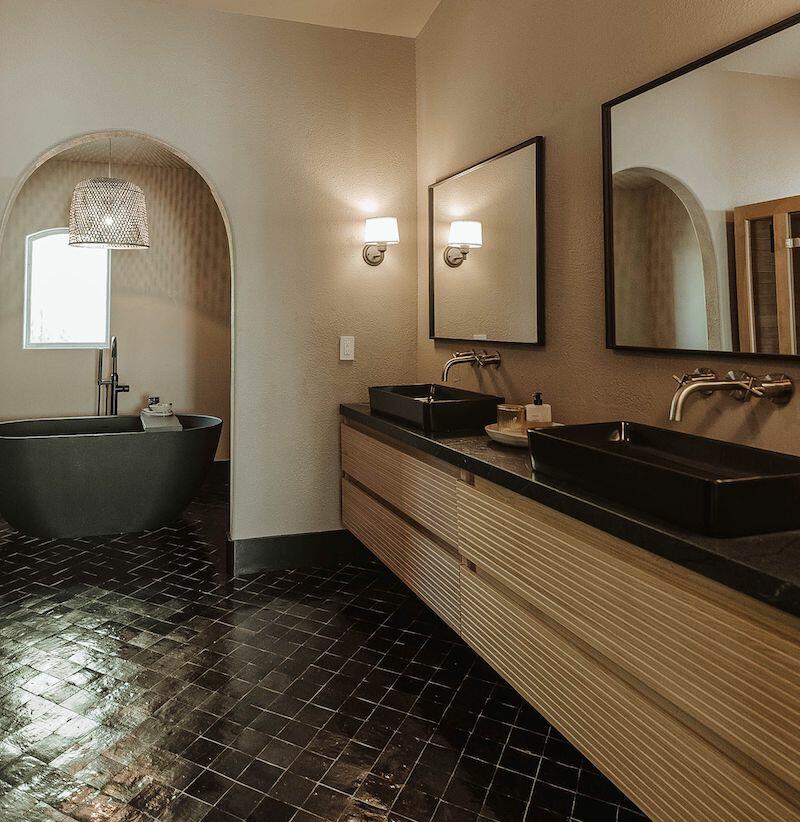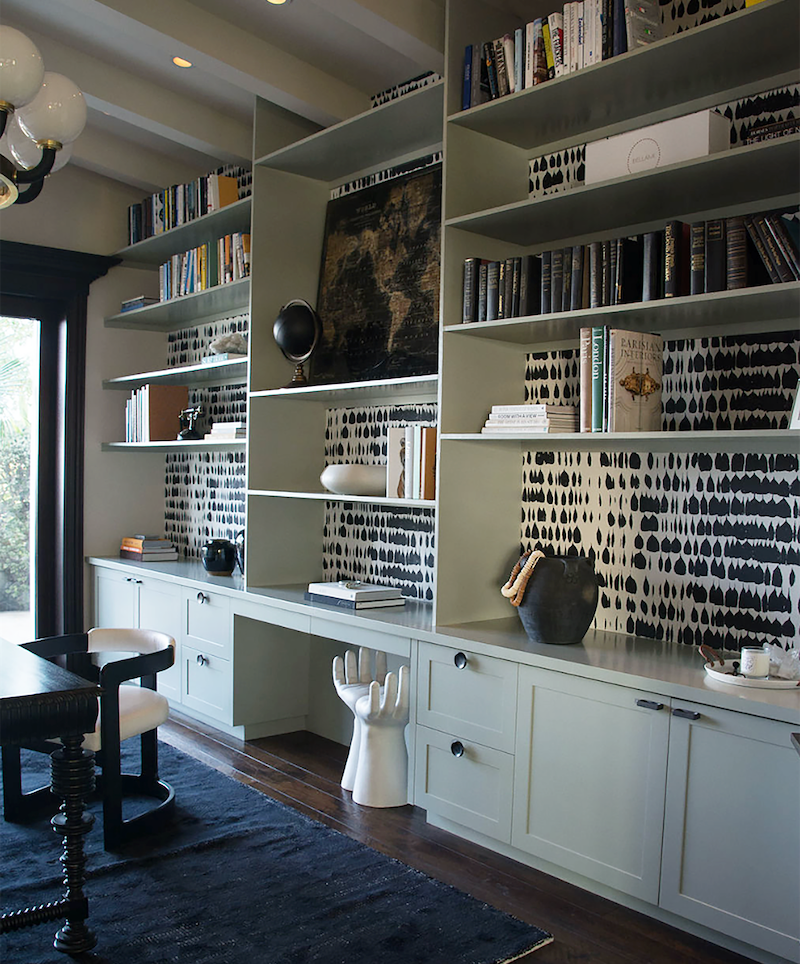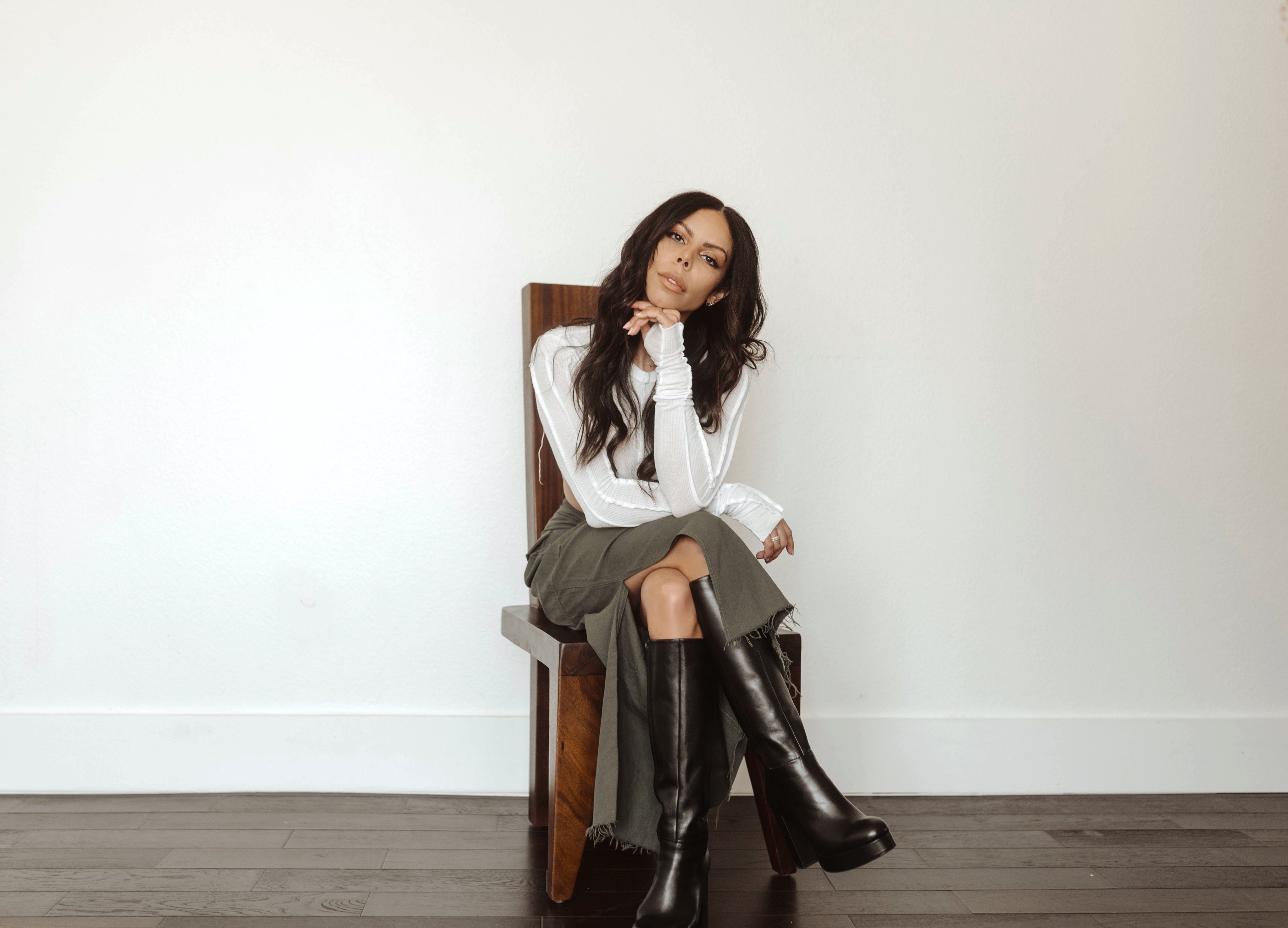In Ask an Influencer, Business of Home explores the creator economy. This week, we spoke with Calabasas, California–based interior designer Brittaney Elise, founder of design firm BE by Brittaney Elise and online marketplace Home By Be.
At 24 years old, Brittaney Elise was a recent college graduate working in a junior role at a notable design firm in her native Los Angeles—but already, she was itching for something bigger. It was 2011, an exciting time to be a young creative, with new platforms like Instagram encouraging users to express themselves and connect, and Elise was no exception. She began posting a mix of behind-the-scenes sourcing and styling tasks from her design job along with snapshots of her everyday life. In the meantime, she also began promoting her design prowess in person among a star-studded social milieu, eventually landing her first major project working on the home of a major music industry manager.
With the completion of that project, word traveled fast. In 2012, Elise officially launched her eponymous firm BE by Brittaney Elise, and as she took on the next generation of Hollywood homeowners—including stars like Zendaya, Selena Gomez and Michael B. Jordan—she brought a growing online audience along for the ride. As she watched her follower count climb (the number now tops 87,000), Elise decided to take her services wider, leading to the 2020 launch of the Home By Be online marketplace, offering a curated selection of decor, lighting and textiles sourced from around the globe.
Ahead, Elise shares how she’s embraced social media’s shifting preference for video content, why paid partnerships don’t have a big place in her business model, and how keeping an eye on TikTok has kept her one step ahead of trends on Instagram.
What did your early social media presence look like?
I loved Instagram way before it was a thing, way before celebrities were on it. It was just this cool app where you could express yourself artistically and share with friends. Out of all the social media platforms, that’s been my primary focus and it’s absolutely evolved and grown—both the platform and me and my brand and the way I represent myself there. [When I first started,] it was very different—there was a lot more lifestyle influencing happening. There was a period, around 2014 through 2017, when I dabbled in showcasing it like a blog. I wasn’t interested in being a blogger or identifying myself that way, but I found that sharing my industry insight—shopping and going to the showrooms and all that—was really interesting, so I was sharing that.
What does it look like today?
I see my @BrittaneyElise account as a portfolio page, but in a way that’s also personable. You can get to know me, the person behind the work. It’s also a client generator. But then there’s also the @HomeByBe account. I was doing a lot of traveling during my blogger era, and those travels really inspired me to collect vendors and pieces from around the globe.
Because I work with really high-profile clients on big jobs and we get booked up, my intention was that one day I was going to be able to offer these [services] to people who can’t afford interior design services, or don’t need an interior designer but love my aesthetic and want my advice on the things that I put into a space. So the thought there was, “OK, go to Brittaney’s marketplace and see what she would get.” That started the idea for Home By Be in 2017, but we didn’t launch properly until the spring of 2020.
We launched during COVID, and it turned out to be great because [everyone] was stuck at home looking at their walls, and those who could afford to spruce up were absolutely doing that. So Home By Be had a great kickstart in 2020, and on that side of the business, social media is definitely more about customer relationships. That’s kind of the difference between the two: @BrittaneyElise is more of a profile, and @HomeByBe has customers coming in to purchase products. I think 85 percent of our business on Home By Be [the website] comes from Instagram.
Did you do any sort of research on social media before you launched the e-commerce store?
Yes, at the time I had been collecting some things from around the world—items from a vintage shop in London, stuff from Morocco—and I was really excited and was posting it on my Stories. There was a way to post stickers users could respond to, because I wanted to receive some engagement to get an understanding of “Do you like this?” That was before I launched—now it’s more like alluding to new things that are coming out, like blurring out photos and saying, “Something’s coming!”

How have you grown your following over the years?
I feel like we can all agree that the algorithms are one big fat question mark. I am no expert by any means when it comes to how things are working behind the scenes. All I can say is that I have reached a place where I’m really grounded, and I’m not allowing social media to influence my content—I don’t feel the need to keep up with the Joneses. Within the last year I really stepped into my power and owned who I am as a woman, and that reflects in my brand. Because of that, I’ve been putting out content that’s really true to who I am and where I am, and truly feeling good that the content I’m putting out is going to be well-received by the people who are meant to receive it.
The times when I’ve felt low in my following or engagement have been the moments that I’ve been trying to keep up the Joneses. When my following increases, it’s been like, “Oh, I’m just being true to my brand.” What also helps, and where I’ve seen the bigger jumps in numbers, is with celebrities or other influencers that engage with my content. That’s most helpful when it’s authentic and they’re saying, “Hey, I love her work,” or “I love this product.” That sharing and cross-contamination of communities also really improves growth.
What’s your strategy for creating content?
Most creators can agree that there’s a level of stress that comes with putting out content and that “keeping up” aspect. When you let go of that, it comes pretty organically. What removed a huge layer of stress is when Instagram started implementing Reels and carousels—it made it so much more fun. Now I can create a Reel with content that can be raw and natural and organic, whereas the cover shot that’s going on the grid can be something a bit more manicured and intentional to fit with the others.
I’ve always had this strategy when it comes to the grid: I want it to look like it was thoughtfully put together. Everyone’s strategy is different, and some people find a lot of success, especially these days, by doing the opposite—it’s a generational thing, not being so manicured and all that—but that, for me, is a big deal from an artistic perspective. For whatever’s going on my grid, I play with alternating wide shots and tight shots and having a human—whether that’s me, or me and my daughter—or just furniture or just a space. I find that alternating is helpful in keeping the content balanced.
What does the physical process of capturing content look like for you?
I’m one with the Stories. I love Stories. When I’m available to be posting, you’re going to see a lot directly from me from my phone with some sort of pretty filter on it. As far as in-feed content goes, it’s a mixture. For video, I tend to make a lot of Reels that show process. For example, I think two or three posts ago were of my home, and we haven’t fully finished shooting the home professionally and haven’t really gotten it out there. I put together a Reel with fast, short clips giving you a glimpse into my personal space, which just endured a huge transformation, because over the last year I completely gutted and renovated it.
Then I’ve also got professionally shot images, which, quite frankly, I don’t have the time or capacity to not schedule. Although a lot of what I will pull together or edit together comes from my organic daily life, [the rest comes from] professional photo shoots. Two weeks ago, we had a shoot and I covered seven different kinds of posts in one morning. We captured my daughter’s birthday, I made her cake, and we had a birthday cake shot—she was turning four, and I wanted to capture that memory—and we got parts of the house photographed, [in addition to] different product collaborations.
I think balance is really important, [along with] mental clarity and awareness of your capacity and your limits and what you can handle in a day or in a week—that’s why I’m big on scheduling. Schedule the content, then schedule time for yourself to sit down and do your edits. I use Planoly to help plan content, and I have everything planned out so I don’t feel overwhelmed or consumed with trying to keep up.

How do you work with brands?
My policy is that it absolutely must relate to the design field, and it needs to be a product that I can use for a project or for clients. That means I have a heavy interest in it, and I usually use my personal properties as a testing ground for anything from tile to wallpaper. Sometimes I have some influential clients, either influencers or celebrities, where I come together with them and a brand, and those are really fun, but I rarely take any kind of paid partnership.
[I’ll only do it when] I’m only obligated to put [a single product] into a space and photograph it or make a video out of it, and [the brand] is happy [rather than expecting a long-term campaign]. So that makes me happy. The bonus is that I discover a new product, and I love that aspect of being able to work with smaller businesses that haven’t been blown up yet, and helping them gain some exposure.
Some people’s full-time job is content creation, and that is how they’re putting food on their table, by taking paid partnership, and that makes sense for them, but that’s not my life path. I’m here to create beautiful spaces, and everything else is a bonus. I see brand partnerships as a fun place to explore, and by putting less pressure on something and not feeling like it’s a project I’m being paid to do, that takes a layer of stress out of social media and Instagram for me. It just makes it fun.
What’s been your response to the social media shift toward video?
It’s funny, when it first happened, I was like, “Oh, dear God.” It sounds like much more work, especially from an interior design perspective. It’s like, “You want us to film everything?” But people just started getting real creative. It’s funny how the collective moves and operates—people started to be like, “I’m going to grab these [still images] and put them to a beat and put them in a Reel.” I love doing that as well. It really grew on me; I have a fun time editing, and I love the music portion as well.
Are you on TikTok?
I’m a huge TikTok consumer—I do not post, I think I’m in my research and development phase—but still, I’m someone who knows the trending songs before they get big on Instagram because I’m on TikTok.
What is your relationship with your social media community? Do you respond to DMs and comments?
I respond as soon as I can, when I can. I am a single mom running these two businesses, and it is a lot. While answering questions that are in my DMs is not my number-one priority, I get to them within a few days or the week. I understand that by being engaged with my audience and my following, it keeps them interested and excited. It increases support. I get DMs to this day from people who dig through my posts, and they’re sending me a post from like five years ago, like, “Where’s this wallpaper from? What about this chair?” So it’s important to share it with them, because that’s what keeps them interested and makes them feel like we are a part of a community together, and that’s a huge purpose of Instagram. It’s not just a portfolio landing page; it’s not just to be like, “Here, like my photos.” It’s to engage with one another.
Is it ever overwhelming to keep up with your presence on social media?
I think at one point, I would have answered that question with “Yes.” But it doesn’t feel that way at all now, because I’ve gotten to a really good space of managing my time and boundaries. Boundaries are a big deal for yourself—you don’t need to tell the world, “I’m signing off at 6 p.m., don’t ask me anything!” But you [have to] know, in your own space, in your own mind, when and where you draw the line for each day. For me, that looks like an organized calendar. Within that calendar, it’s finding a dedicated time where I’m going to spend half an hour scrolling and engaging in other people’s stuff or answering DMs or getting on Planoly or just editing some photos—whatever that looks like, depending on the week. If I’ve got project deadlines that are taking precedence over social media, then it is what it is for that week. The next week, I may decide that I want to prioritize planning some posts for next month, so I carve out more time in my calendar.
How much of yourself do you show on social media?
I try to find a good balance—and when I say balance, I don’t really mean 50-50. I have found in [terms of] engagement that my page could just be [my daughter] Olivia because she gets so much engagement—people love her! People like people. Although I’m not a fashion stylist or a makeup artist or something like that, I am doing something personal for people in their homes. I think that [I try to find] a balance between the human aspect—having myself on there—and then having the projects and my work.
From a business strategy perspective, what are you analyzing most about your social media right now?
For 2023, I have a big focus on elevating the brand’s presence. I have had a lot of focus on Home By Be since 2020, and my goal this year is getting my social media presence to catch up to who I am and how I feel now. If I am my brand, I feel that I’ve truly elevated myself in many ways: as a woman, as a professional, as a business owner, as someone that is in the spotlight or that is looked up to by a lot of people that DM me. So I’m really focused on getting my social media to a point that is caught up with how I feel and wish to be perceived. I’m really excited about that from a visual standpoint—revamping my website and Instagram, and then [being] in this development phase for TikTok. The design services side of the business is also working on projects everywhere from Los Angeles to Las Vegas to Texas to New York, and all the way to Amsterdam. We are packed, and there will be a lot of content that will come with that, but it’s also going to help propel me into next year, when I hope to really figure out a strategy for TikTok and make a big splash there next year.
Homepage image: Brittaney Elise | Courtesy of BE by Brittaney Elise





























